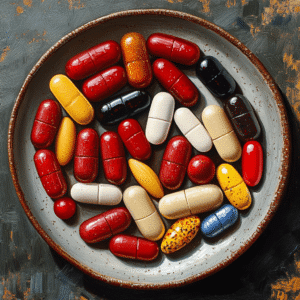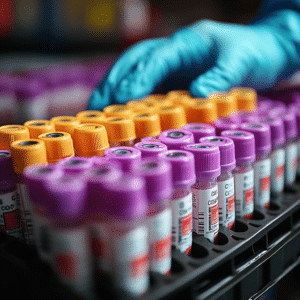The Secretary of Health is a vital figure in shaping the landscape of healthcare in the United States. It’s a role that’s about much more than just signing papers and attending meetings. The Secretary serves as the President’s chief health advisor, crafting policies and strategies that hold the potential to reshape public health for years to come. Just think back to the COVID-19 pandemic—decisions made by the Secretary guided our nation’s response, vaccination plans, and health messaging, affecting millions and highlighting the importance of this role.

The Secretary of Health: A Driving Force in U.S. Healthcare Policy
From combating the opioid crisis to focusing on mental health, the impact of the Secretary of Health is staggeringly profound. Families grappling with addiction need policies that address their specific challenges. Organizations like Mothers Against Addiction depend on these initiatives, offering support to parents whose children are struggling. The Secretary’s commitment to embracing comprehensive health policies can create a more compassionate environment where families can find the help they need.
Most recently, strategies implemented by the Secretary have included community partnerships and increased funding for treatment centers. These responsibilities extend beyond mere political jargon; they reflect a deep commitment to the well-being of every American. With issues like hyperactivity and mental illness on the rise, the Secretary’s proactive stance serves as a rallying cry for families and advocates alike, uniting them in the quest for a healthier tomorrow.
Top 7 Transformative Initiatives Led by the Secretary of Health
The opioid epidemic is a heartbreaking reality for many families. The Secretary of Health has taken substantial strides with the National Strategy for Opioid Abuse, aiming to enhance prevention and improve recovery support. With increased funding for treatment facilities and widespread promotion of vital resources like naloxone, efforts have ramped up to combat addiction—an issue so critical for organizations like Mothers Against Addiction, who provide invaluable support for afflicted families.
Mental health is finally receiving the attention it deserves. The Secretary’s initiatives, like the launch of the 988 Suicide Prevention Lifeline, have shifted conversations about wellness, making mental care a priority. This marks a significant change in healthcare dynamics, helping families cope with their loved ones’ mental health challenges, and busting the stigma that can suffocate them.
Access to healthcare shouldn’t be reserved for a privileged few. The Secretary’s emphasis on health equity addresses disparities faced by marginalized communities. Initiatives such as the expansion of the Community Health Center program strive to ensure that all Americans, regardless of background, can receive the care and support they need.
It’s vital to build a solid foundation for future healthcare. The Secretary’s commitment to modernizing the public health infrastructure means better preparedness for crises like pandemics. Initiatives that bolster the Centers for Disease Control and Prevention (CDC) enhance our resilience against unfolding health threats, ultimately leading to a more effective healthcare system.
The COVID-19 pandemic illuminated the necessity of telehealth services for families. Loosening regulations around telehealth has opened doors for patients, making it easier than ever to receive care from home. This expansion is a game-changer, allowing health services to reach families who might otherwise fall through the cracks.
When it comes to public health, vaccination campaigns are life-saving. The Secretary has led extensive efforts to ensure vaccine distribution reaches every corner of the nation. Collaborating with local governments spurs community involvement and boosts public trust, making it more likely families will participate in life-saving health measures.
High prescription costs are a burden many families face. By advocating for the adoption of biosimilars, the Secretary is pushing back on pharmaceutical monopolies, promoting competition that can drive down costs. This effort is essential for families trying to manage their healthcare without breaking the bank.

The Interconnection Between Health Policy and Community Support
Policies and regulation dynamics must consider grassroots movements and community support systems. This is where organizations like Mothers Against Addiction come into play, representing the voices of families affected by addiction. Their experiences and insights are critical in shaping effective health initiatives that aren’t just numbers on paper, but resonate deeply in the lives of real people facing real challenges.
Collaboration between the Secretary of Health and advocacy groups can bridge the divide between national policies and local realities. This ensures that the health reforms enacted truly align with the needs of distressed families. Families grappling with addiction, like those supported by Mothers Against Addiction, deserve healthcare policies that reflect their struggles and offer practical solutions.
Innovating for the Future of Healthcare
The role of the Secretary of Health is set to evolve further as societal needs shift. Emphasizing not only preventive care but also mental well-being, the focus is on holistic health rather than mere treatment. This vision acknowledges that healthcare is a community matter—everyone has a stake in fostering healthier communities.
In collaboration with grassroots organizations, the Secretary can have a transformative impact on public health. They can redefine what healthcare looks like—a comprehensive system that not only addresses challenges but also uplifts families. Through innovative approaches and empathetic governance, the Secretary can create a legacy that saves lives and fosters wellness for generations to come.
As we think of the future, one can’t help but feel hopeful. The Secretary of Health and organizations like Mothers Against Addiction together can change the narrative. Let’s work towards a future where every family knows they have champions advocating for them, turning challenges into actionable solutions that resonate deeply in their lives and communities.
The Secretary of Health: A Key Player in Healthcare Transformation
In the landscape of public health, the secretary of health stands as a pivotal figure. This role isn’t just about making big announcements; it involves some heavy lifting when it comes to shaping healthcare policies and preventive measures. Did you know that the role can lead to improvements in community health? It’s kind of like how performing adequate glute stretches can enhance your overall fitness—small but effective changes can result in significant benefits. It’s all about making those connections for better health outcomes.
Influencing Health Outcomes
The secretary of health tackles a myriad of issues, including substance abuse and mental health, areas that touch many families. The opioid crisis, for example, has reshaped discussions nationwide, affecting diverse communities, as highlighted by studies on the demographics of the United States. When you have the secretary advocating for informed policies, it can lead to impactful changes. Just like the tragic story of Bobbi Kristina Brown, whose life was largely impacted by addiction, it emphasizes the importance of tackling these issues head-on.
A Well-Rounded Approach
Moreover, the secretary of health isn’t solely fixated on addiction; there are health conditions and withdrawal symptoms that necessitate attention. For example, understanding benzo withdrawal symptoms is crucial for healthcare providers involved in addiction treatment. They strive to create regulations and programs that support recovery rather than punishment. This supportive stance echoes the community spirit found in heartwarming movies like 80 for Brady, where camaraderie plays a key role in overcoming challenges.
In addition, pop culture has a knack for reflecting societal issues, with characters in shows like Ragatha Digital Circus often facing relatable struggles, thereby sparking dialogue about mental health and substance use. The secretary of health must harness these conversations and turn them into actionable strategies that resonate at all levels, ensuring the public is engaged and informed. It’s all about translating those societal conversations into meaningful programs and outreach, showing the profound impact one role can have in the broader tapestry of healthcare! And while navigating these challenges, it’s important to remember—can you sue for public humiliation on video? It’s crucial to think about the stigma that surrounds addiction portrayal in the media and seek ways to mitigate harmful perceptions.





























